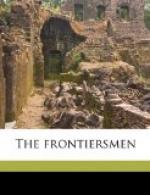With the plethora of interest involved in these subjects, Varney grew oblivious of the theme that had earlier occupied his mind. It recurred no more to his thoughts until several days had passed. He then chanced to be occupied with his new goods in his cavern. It was illumined only from above; there was a trap-door in the floor of the trading-house, and thence a pale tempered light drifted down, scarcely convenient, but sufficient for his purposes. Once he noticed that a shadow flickered across it. He experienced a momentary surprise, for he had left no one in the building, and the outer door being locked, he imagined it could not be forced without noise enough to rouse him. Again the shadow flickered across the trap-door; then ensued a complete eclipse of the scant glimmer of light. There was a step upon the ladder which served as stairway—a man was descending.
Varney felt a sudden constriction about his throat. He realized an impending crisis; the door above had been closed; by the sound he knew that the ladder was now removed and laid upon the ground. He had an idea—he could see naught—that the unknown invisible man had seated himself on the ladder on the ground, where he remained motionless, silent, in anger, in grief, or some strange savage whim hardly possible for a civilized creature to divine.
The time that passed in this black nullity—he never could compute it—moments, doubtless, but it seemed hours, tried to the utmost the nerve of the entrapped trader, albeit inured by twenty years’ experience to the capricious temper of the Cherokee Indians. He felt he could better endure the suspense could he only see his antagonist, identify him, and thus guess his purpose, and shape his own course from his knowledge of character. But with some acquired savage instinct he, too, remained silent, null, passive; one might have thought him absent. Perhaps his quiescence, indeed, fostered some doubt of his presence here, for suddenly there sounded the rasping of flint on steel, the spunk was aglow, and then in the timorous flame of the kindling candle, taken from his own stores above, Varney recognized the face and figure of the stately and imperious old chief Colannah. The next moment he remembered something far more pertinent. He called out in an agitated voice to the Indian to beware of the powder with which the place was largely stocked.
“I came for that,” said Colannah in Cherokee, with unaccustomed fingers snuffing the wick as he had seen Varney perform the process, for the Indians used torches and fires of split cane for purposes of illumination.
“For God’s sake, what have I done?” cried the trader in an agony of terror, desirous to bring his accusation to the point as early as might be and compass his release, thus forestalling the violent end of an explosion.
“What do the English always?—you have robbed me!” said Colannah, the light strong on his fierce indignant features, his garb of fringed buckskin, his many rich strings of the ivory-like roanoke about his neck, his gayly bedecked and feathered head, and in shadowy wise revealing the rough walls of the cave, the boxes and bales of goods, the reserve stock, as it were, the stands of arms, and the kegs and bags of powder.




